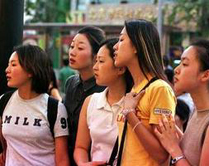
China's teenagers hold positive and healthy attitudes toward life and study, despite the mixed influences of traditional Chinese and modern Western cultures, according to a survey by Beijing Normal University.
Youngsters said they know the power of money, but also hold friendship and classroom democracy as important, in the survey of 2,965 Beijing middle school students by Professor Pei Dina.
The survey, published and analyzed by Sunday's China Education Daily, showed 84.9 percent acknowledged the indispensable power of money, but most refused to make money their ultimate goal in life.
Instead, 72.9 percent regarded health and friendship as most precious.
Ideas like equality, freedom and democracy had a greater influence on the life values of the young generation, as China opened wider to the outside world, Professor Pei said.
"Most of the pupils are eager to freely voice their opinions," she said, noting that they believed that everyone in the class should be given an equal opportunity to act as a class cadre on a rotating basis.
Of all the respondents, 94.8 percent agreed that "society should give everyone an equal chance to develop".
Classroom democracy was a major concern for Beijing teenagers, Pei said, and over 60 percent of students favored a secret ballot in choosing classroom leaders, while 90.8 percent believed in the principle of free discussion and the "minority following majority" when dealing with differences in class.
The majority of students emphasized their rights to privacy and personal freedom, Professor Pei said.
The survey showed that 71.4 percent strongly defended their privacy, claiming that parents or teachers who secretly read their letters or diaries hurt their personal right to privacy.
"The yearning for freedom reflects their cry for independence," Professor Pei said. Statistics showed that only one percent were willing to let parents make decisions for them, while 74.4 percent believed in their own ability to lead an independent life.
With more choices to be made on their own, Beijing youngsters are interested in Hollywood movies. The survey said 67.4 percent expressed their fondness for Western blockbusters, with 47.5 percent praising them for "professional photography, good audio and visual effects" and 41.4 percent for "novel stories and intriguing plots".
However, high regard for foreign movies did not mean Chinese students worshipped foreign cultures or lifestyles, as only 13.1 percent said they liked "foreign cultures and lifestyles propagated in foreign movies", Professor Pei said.
The survey also revealed that most students had a strong sense of patriotism and were ready to strike a balance between individual and collective interests.
Despite the healthy and positive mainstream of the student values, there still existed many problems, as most teenagers swayed between the values advocated by traditional Chinese culture, market economic culture and Western culture, noted Pei.
Almost half or 49.5 percent of the teenagers thought it was necessary to build personal connections in a market economy, which would at times help them achieve more success than hard work, the survey showed.
Some students, added Pei, though claiming to be independent, were unwilling to do house chores at home. Some even said they would not enlist in the army as required by the state unless there was no other way out.
Such problems were inevitable as China underwent economic restructuring and Western culture interacted with traditional values, she said, stressing that these problems could only be addressed if educators and parents did more to guide teenagers to foster their values.
Teenagers born since the 1980s are generally known as "little emperors" in China, as many are doted on by parents because they are the only child. Chinese parents and grandparents have never had the experience of dealing successfully, or otherwise, with a generation without brothers and sisters.
(Xinhua News Agency August 12, 2003)
|

